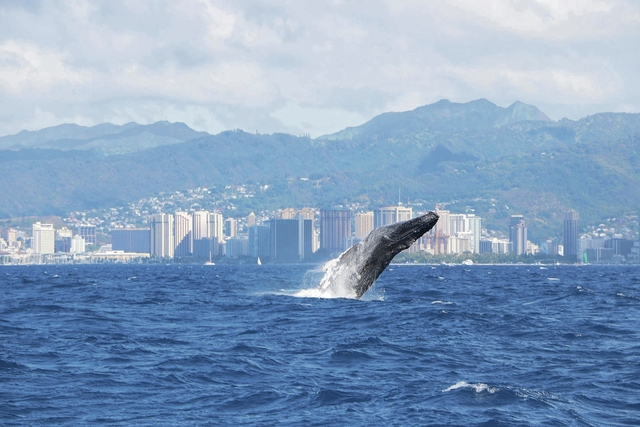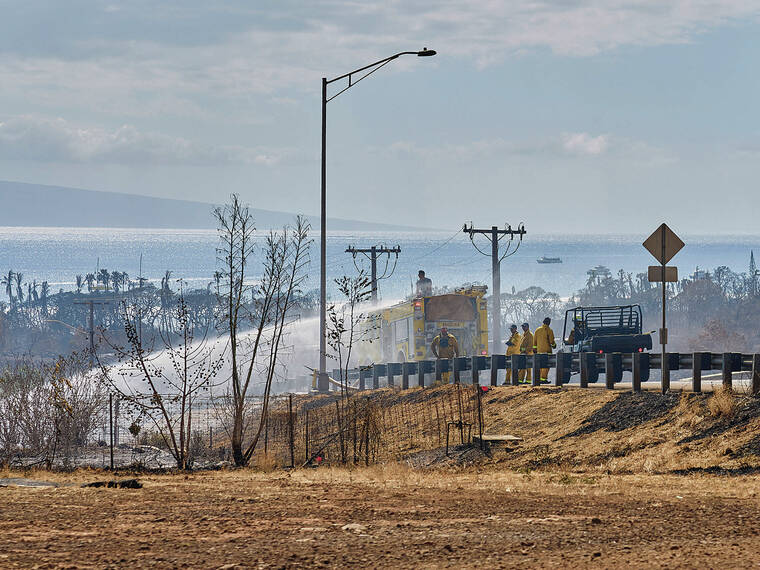Military’s bomb plan could hurt ocean life

JO KERNS / SPECIAL TO THE STAR-ADVERTISER
A total of 36 animals could sustain permanent hearing loss, the Air Force said, based on density estimates for various marine species. The humpback whale, sei whale, minke whale, pygmy sperm whale, dwarf sperm whale and Fraser’s dolphin are some of the mammals listed that could be harmed.
The Air Force is proposing to conduct live-fire tests of missiles and other ordnance in and above the ocean about 50 miles west of Kauai.
Today is the deadline to submit public comments on the tests, which the military acknowledges could deafen some marine mammals.
The 86th Fighter Weapons Squadron, based at Eglin Air Force Base, Fla., submitted a request with the National Marine Fisheries Service for authorization to harm the hearing of an estimated 637 whales and dolphins.
From Sept. 1 through August 2022, as part of the Long Range Strike Weapons Systems Evaluation Program (WSEP), fighters and bombers would test the ordnance over the ocean range operated by the Pacific Missile Range Facility at Barking Sands.
“Without WSEP operations, pilots would be using these weapons for the first time in combat,” the Air Force said in the application, submitted in December. “On average, half of the participants in each unit drop an actual weapon for the first time during a WSEP evaluation. Consequently, WSEP is a military readiness activity and is the last opportunity for squadrons to receive operational training and evaluation before they deploy.”
The squadron plans to test about 110 munitions each year in the area, which has a depth of 15,240 feet.
Don't miss out on what's happening!
Stay in touch with breaking news, as it happens, conveniently in your email inbox. It's FREE!
The Air Force said in its application that no mammals are expected to die as a result.
“Sound and pressure metrics associated with exploding ordnance were determined to be the only activities with potential for significant impacts to marine species,” the application said.
A total of 36 animals could sustain permanent hearing loss, the Air Force said, based on density estimates for various marine species. About 382 animals could suffer temporary hearing loss, and about 219 animals would experience significant change in natural behavioral patterns — migration, surfacing, nursing, breeding and feeding — due to the explosions.
The humpback whale, sei whale, minke whale, pygmy sperm whale, dwarf sperm whale and Fraser’s dolphin are some of the mammals listed that could be harmed.
Marti Townsend, director of the Sierra Club of Hawaii, said she was concerned about the impact on marine life.
“Military testing is ruining the quiet of our oceans, quiet that we know marine mammals need to navigate, hunt, raise their young and communicate,” she said by telephone Sunday. “Federal courts have ruled that military exercises harm marine mammals and must be strictly regulated.”
The fisheries service posted the Air Force’s application in early January. Comments can be sent by email to ITP.McCue@noaa.gov or by traditional mail to Jolie Harrison, Chief, Permits and Conservation Division, Office of Protected Resources, National Marine Fisheries Service, 1315 East-West Highway, Silver Spring, MD 20910.
4 responses to “Military’s bomb plan could hurt ocean life”
Leave a Reply
You must be logged in to post a comment.





This is the classical case, of the tourism industry, clashing with the military.
The tourists want to see whales and the military will unintentionally harm or kill the whales.
In the olden Hawaii, the old timers, would engage in dynamite fishing. You drop a stick of dynamite in the water, and the dead fish would rise to the surface.
The military will explode huge missiles, either above the water line or below the water line, and expect everyone to believe, that the sea life will not be effected. It will be a good time, to collect dead fish, and whales.
People should be submitting testimony and appearing at the government hearings.
Maybe the military, can practice in Okinawa.
How about Off shore N Korea. Hmmm.
Why are they not picking a more remote location very far away from Kauai and deeper into the Pacific. This would make it less likely that this would
hurt or injure whales, dolphins etc would it not.
I’m not sure what these bombs are going to do but if Hawaii ever gets attacked, I hope it works.